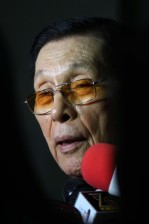Enrile notes lack of prosecutors’ trial savvy
Senate President Juan Ponce Enrile on Wednesday said the lack of trial court experience of most of the House prosecutors was the reason for the panel’s request for the impeachment court to be “more liberal” in the observance of the rules of court.
“I think [the prosecutors] are having a hard time putting their questions across. There’s a reason for that. They are not used to a trial court. Because if they are, there should be no problem… That’s my impression,” Enrile said in an ambush interview, speaking mostly in Filipino.
He pointed out that lead defense counsel Serafin Cuevas, a former Supreme Court associate justice and ex-justice secretary, was not hampered by the same problem and was well-versed with the rules of court and of evidence.
The lead House prosecutor, Representative Niel Tupas Jr., inadvertently showed the other day how unprepared the prosecution was in presenting evidence against Chief Justice Renato Corona.
After Cuevas reiterated his arguments against the inclusion of evidence that would allegedly prove Corona’s ill-gotten wealth and other questionable assets in Article 2 of the impeachment complaint, Tupas complained that the Senate was acting “more like a criminal court” and asked Enrile as presiding officer to be more “liberal” and “flexible.”
Article continues after this advertisementTupas added that due to “about 30” objections aired by the defense, his panel was forced to reform its questions to the witnesses “about 20 times.”
Article continues after this advertisementHow flexible?
But when questioned by Enrile, Tupas could not say exactly how much more leeway he wanted the impeachment court to give.
“He could not answer…” said Enrile, a trial lawyer before joining the government. “How flexible can a presiding judge be? Would the presiding officer just give in to [all their motions]? Would that not make things more disorderly?”
Enrile added that a lawyer used to court proceedings could easily “reform questions in many ways.”
On Tuesday, Tupas also received a tongue-lashing from Senator Miriam Santiago when he could not immediately say how many witnesses the prosecution intended to present throughout the trial.
But when Cuevas was asked the same for the defense, he immediately replied that 15 witnesses would be presented.
Constant study
According to Enrile, a lawyer who does his homework will be confident “because my trial brief will just be in front of me.”
“Any argument that my opponent will present, all the answers are there in my trial brief. Note that when I asked Justice Cuevas about the rules, [he would answer immediately]. That is the result of constant study,” he said.
In Tuesday’s hearing, Enrile took the prosecution to task for apparently letting the Christmas break pass without consolidating its evidence and witnesses after transmitting the articles of impeachment to the Senate.
He also insisted that as presiding officer, he had been fair in deciding all motions filed by the contending camps.
“To my knowledge, I did nothing wrong. Everything that I decided on was based on the provisions of the Rules of Court and the Rules of Evidence,” he said.
Not first time
Still, Enrile said he understood why the prosecutors were seeking more flexibility.
“This is not the first time this happened and it won’t be the last. Every time lawyers begin to have problems with their presentation, they want a situation where evidence can be presented without being blocked,” he said, adding:
“Of course, that’s not going to happen. If you are a trial lawyer, you are on your own. You must be ready to think on your feet. You cannot go to the library. You cannot consult anybody. You have to use your knowledge of the laws and the rules and your preparation.”
Enrile also said Tupas et al. should not be disheartened by orders to reform their questions.
“That is the proper ruling. That’s an easy thing to do. Remember, if you are used to court proceedings, you are supposed to tell a story not directly but through a witness. That is a trial. Cross-examination is a different story,” he said.
Rules of Evidence
That comment was apparently spurred by private prosecutor Mario Bautista’s earlier direct examination of Supreme Court Clerk of Court Enriqueta Vidal.
Several times Enrile warned Bautista that he sounded like he was cross-examining Vidal, and even suggested that Bautista classify her as a hostile witness so he can cross-examine her.
“In cross-examination, you can ask any question except [a] misleading question. You can even ask [a] leading question. But when you are presenting your evidence, … you have to follow the Rules of Evidence because all these are safeguards of liberty,” Enrile said.
“We destroy these rules and innocent people will go to jail,” he said.
